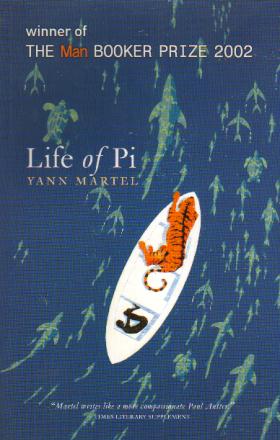
Yann Martel
The following novels constitute the shortlist for the 2002 Man Booker Prize:
Prior to the announcement of the shortlist you could get very short odds on William Boyd and Zadie Smith making the list. So their omission is something of a shock. As usual there were no previous winners on the list.
In 2002 the panel read 130 novels, with 118 being submitted by publishers and 12 being called in by the judges. Again the feeling amongst the panel members was that this number was far too high. We'll have to wait and see if anything of consequence is done to reduce the number in the coming year.
The Booker Prize process usually throws up some sort of controversy and this year was no exception. In the past it has generally involved a judge or writer doing a major "dummy-spit" and walking out of the process mid-stream (in the case of the judge) or bad-mouthing the whole "charade" in the British press, in the case of the writer. This year we were treated to the premature "announcement" of the winner a week early on the Man Booker website. Interestingly enough they actually displayed the "right" winner, though I tend to believe this was because Mantel's entry was first on the shortlist (arranged alphabetically by author surname) rather than for any foreknowledge on behalf of the person in charge of the website. More likely a trial web page was set up to test the announcement of the winner, and the trial page got published on the "live" website in error. A simple enough mistake to make, and hopefully the Man group will install some better implementation procedures next year.
The judges for the 2002 Booker prize are: Professor Lisa Jardine - writer, critic and broadcaster; David Baddiel - writer and comedian; Russell Celyn Jones - novelist and short story writer; Salley Vickers - novelist and analytical psychologist; and Erica Wagner - Literary Editor of The Times.
2002 Longlist
Notable Omissions from the 2002 Long/Shortlist

|
Life of Pi Yann Martel |
Dustjacket synopsis:
"After the tragic sinking of a cargo ship, one solitary lifeboat remains bobbing on the wild, blue Pacific. The crew
of the surviving vessel consists of a hyena, a zebra (with a broken leg), a female orang-utan, a 450 pound Royal Bengal
tiger and Pi - a 16-year-old Indian boy. The scene is set for one of the most extraordinary pieces of literary fiction
of recent years.
"Yann Martel's Life of Pi is a transformative novel, a dazzling work of imagination that will delight and astound readers in equal measure. It is a triumph of storytelling and a tale that will, as one character puts it, make you believe in God. Can a reasonably ask for anything more?"
Quotes:
"Martel writes like a more compassionate Paul Auster." - Times Literary Supplement
"Those who would believe that the art of fiction is moribund - let them read Yann Martel with astonishment, delight and
gratitude." - Alberto Manguel
"The whole fantastic voyage carries hints of The Old Man and the Sea and the magic realism of Amado and Marquez
and the absurdity of Beckett...Yann Martel does a beautiful job." - Globe and Mail (Toronto)
"Martel finds dazzling ways of expressing the hitherto unexpressed." - Mail on Sunday
"reminiscent of Italo Calvino" - Independent on Sunday
First Paragraph:
My suffering left me sad and gloomy.
Academic study and the steady, mindful practice of religion slowly brought me back to life. I have kept up what some people would consider my strange religious practices. After one year of high school, I attented the University of Toronto and took a double-major Bachelor's degree. My majors were religious studies and zoology. My fourth-year thesis for religious studies concerned certain aspects of the cosmogony theory of Isaac Luria, the great sixteenth-century Kabbalist from Safed. My zoology thesis was a functional analysis of the thyroid gland of the three-toed sloth. I chose the sloth because its demeanour - calm, quite and introspective - did something to soothe my shattered self.
There are two-toed sloths and there are three-toed sloths, the case being determined by the forepaws of the animals, since all sloths have three claws on their hind paws. I had the great luck one summer of studying the three-toed sloth in situ in the equatorial jungles of Brazil. It is a highly intriguing creature. Its only real habit is indolence. It sleeps or rests on average twenty hours a day. Our team tested the sleep habits of five wild three-toed sloths by placing on their heads, in the early evening after they had fallen asleep, bright red plastic dishes filled with water. We found them still in place late the next morning, the water of the dishes swarming with insects. The sloth is at its busiest at sunset, using the word busy here in the most relaxed sense. It moves along the bough of a tree in its characteristic upside-down position at a speed of roughly 400 metres an hour. On the ground, it crawls to its next tree at a rate of 250 metres an hour, when motivated, which is 440 times slower than a motivated cheetah. Unmotivated, it covers four to five metres in an hour.
From the Canongate paperback edition, 2002.
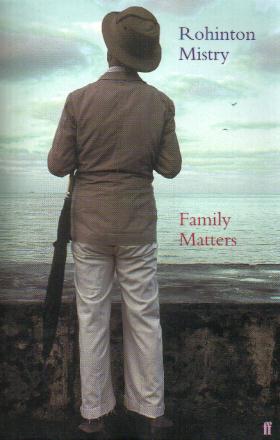
|
Family Matters Rohinton Mistry |
Dustjacket synopsis:
"Nariman Vakeel is a 79-year-old Parsi widower and the patriarch of a small discordant family. Beset by Parkinson's
disease and haunted by memories of the past, he lives in a once-elegant apartment with his two middle-aged stepchildren -
Coomy, bitter and domineering, and her brother, Jal, mild-mannered and acquiescent. When Nariman's illness is compounded
by a broken ankle, Coomy plots to turn his round-the-clock care over to Roxana, her sweet-tempered sister. She succeeds,
but not without cost, and eventually Nariman takes up residence with Roxana, her husband, Yezad, and their two young sons.
The effect of the new responsibility on Yezad, who is already beseiged by financial worries, pushes him into a scheme of
deception involving Vikram Kapur, his eccentric, often exasperating employer at Bombay Sporting Goods Emporium. This sets
in motion a series of events - a great unravelling and a revelation of the family's love-torn past - that leads to the
narrative's final outcome.
"Family Matters is Rohinton Mistry's eagerly anticipated third novel, following the success of his highly acclaimed A Fine Balance (1995), which won several major literary awards internationally. Born in Bombay, Rohinton Mistry has lived in Canada since 1975. Both his previous novels have been shortlisted for the Booker Prize."
First Paragraph:
A splash of light from the late-afternoon sun lingered at the foot of Nariman's bed as he ended his nap and looked towards the clock. It was almost six. He glanced down where the warm patch had lured his toes. Knurled and twisted, rendered birdlike by age, they luxuriated in the sun's comfort. His eyes fell shut again.
By and by, the scrap of sunshine drifted from his feet, and he felt a vague pang of abandonment. He looked at the clock again: gone past six now. With some difficulty he rose to prepare for his evening walk. In the bathroom, while he slapped cold water on his face and gargled, he heard his stepson and stepdaughter over the sound of the tap.
"Please don't go, Pappa, we beseech you," said Jal through the door, then grimaced and adjusted his hearing aid, for the words had echoed deafeningly in his own ear. The device was an early model; a metal case the size of a matchbox was clipped to his shirt pocket and wired to the earpiece. It had been a reluctant acquisition four years ago, when Jal turned forty-five, but he was not yet used to its vagaries.
From the faber and faber paperback edition, 2002.
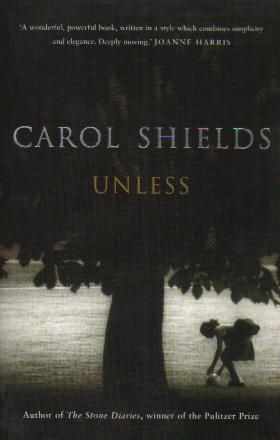
|
Unless Carol Shields |
Dustjacket synopsis:
"Reta Winters, 44 years of age, has started a new sort of life. She has discovered the meaning of loss for the first time.
"For all of her days, Reta has enjoyed the useful monotony of happiness: a loving family, good friends, growing success as a writer of light fiction, novels 'for summertime'. This placid existence cracks opens one fearful day when her beloved eldest daughter, Norah, drops out to sit on a gritty street corner, silent but for the sign around her neck that reads 'GOODNESS'. Reta's search for what drove her daughter to such a desperate statement turns into an unflinching and surprisingly funny meditation on where we find meaning and hope.
"Warmth, passion and wisdom come together in Shields' remarkably supple prose. Unless a harrowing but ultimately consoling story of one family's anguish and healing, proves her mastery of extraordinary fictions about ordinary life."
Quotes:
"A wonderful, powerful book, written in a style which combines simplicity and elegance. Deeply moving." - Joanne Harris
"Shields is about the best we have, she does not just express what oft was thought; she snags the shadows of those
thoughts, the thoughts we did not know we had. The effect - at once elating and visceral - feels like a conjurer pulling
a handkerchief from your heart. - Daily Telegraph
"The scope of a Dickens, the wit of Muriel Spark and the stylistic inventiveness of Graham Swift." - Elizabthe Benedict,
The Los Angeles Times
First Paragraph:
It happens that I am going through a period of great unhappiness and loss just now. All my life I've heard people speak of finding themselves in acute pain, bankrupt in spirit and body, but I've never understood what they meant. To lose. To have lost. I believed these visitations of darkness lasted only a few minutes or hours and that these saddened people, in between bouts, were occupied, as we all are, with the useful monotony of happiness. But happiness is not what I thought. Happiness is the lucky pane of glass you carry in your head. It takes all your cunning just to hang on to it, and once it's smashed you have to move into a different sort of life.
In my new life - the summer of the year 2000 - I am attempting to "count my blessings." Everyone I know advises me to take up this repellent stragey, as though they really believe a dramatic loss can be replaced by the renewed application of all one has been given. I have a husband, Tom, who loves me and is faithful to me and is very decent looking as well, tallish, thin, and losing his hair nicely. We live in a house with a paid-up mortgage, and our house is set in the prosperous rolling hills of Ontario, only an hour's drive north of Toronto. Two of our three daughters, Natalie, fifteen, and Christine, sixteen, live at home. They are intelligent and lively and attractive and loving, though they too have shared in the loss, as has Tom.
And I have my writing.
From the 4th Estate paperback edition, 2002.
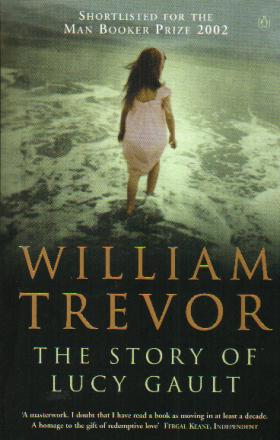
|
The Story of Lucy Gault William Trevor |
Dustjacket synopsis:
"It is the summer of 1921 and eight-year-old Lucy Gault stays close to the gelns and woods above Lahardane - the much-loved
house that her family is being forced to abandon. She knows that danger threatens and the Gaults are no longer welcome
in ireland. Lucy, however, is headstrong and decides that somehow she must force her parents into staying. But the path
she chooses ends in disaster. One chance event, unwanted and unexpected, will blight the lives of the Gaults for years to
come and bind each of them in different ways to this one moment in time, to this beautiful stretch of coast..."
Quotes:
"A masterwork. I doubt that I have read a book as moving in at least a decade. A homage to the gift of redemptive love." -
Fergal Keane, Independent
"Gravely beautiful, subtle and haunting" - Hermoine Lee, Guardian
"Astonishing, tender. A perfect novel" - Sunday Telegraph
"Stark yet tender, without a single false note. There will only be a handful of novels worth reading this year (or any
year)...this book is certainly one" - Literary Review
"Flawless...not a single word seems out of place. Guaranteed to keep you reading - all through the night if necessary -
to find out what happens. Trevor's best novel." - New Statesman
"Striking, thoughtful. Written with grave and finesse and charged throughout with a pervasive disquiet" -
Independent
"Dark, elegantly written....a book ro relish" - Independent on Sunday
"Unusual, beguiling, beautiful" - The Times
"A novelist working at full power in a tale of intense and intensifying sadness" - Julian Barnes, The Times Literary
Supplement
"Trevor at his best" - John Mortimer, Observer
First Paragraph:
Captain Everard Gault wounded the boy in the right shoulder on the night of June the twenty-first, nineteen twenty-one. Aiming above the trespassers' heads in the darkness, he fired the single shot from an upstairs window and then watched the three figures scuttling off, the wounded one assisted by his companions.
They had come to fire the house, their visit expected because they had been before. On that occasion they had come later, in the early morning, just after one. The sheepdogs had seen them off, but within a week the dogs lay poisoned in the yard and Captain Gault knew that the intruders would be back. 'We're streteched at the barracks, sir,' Sergeant Talty had said when he came out from Enniseala. 'Oh, stretched shocking, Captain.' Lahardane wasn't the only house under threat; every week somewhere went up, no matter how the constabulary were spread. 'Please God, there'll be an end to it,' Sergeant Talty said, and went away. Martial law prevailed, since the country was in a state of unrest, one that amounted to war. No action was taken about the poisoning of the dogs.
From the Penguin paperback edition, 2003.
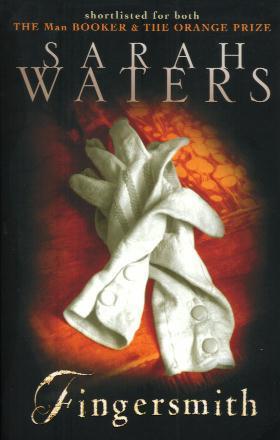
|
Fingersmith Sarah Waters |
Dustjacket synopsis:
"From the celebrated author of Tipping the Velvet and Affinity comes an extraordinary, ingenious tale of
fraud, insanity and secrets.
"London 1862. Sue Trinder, orphaned at birth, grows up among petty thieves - fingersmiths - under the rough but loving care of Mrs Sucksby and her 'family'. But from the moment she draws breath, Sue's fate is linked to that of another orphan growing up in a gloomy mansion not too many miles away."
Quotes:
"Sarah Waters is one of the best storytellers alive today..." - Matt Throne, Independent on Sunday
"Intensely atmospheric, imeccably paced and cunningly structured, this is that rarity in contemporary fiction: a
deeply serious novel that is also a thumping good read" - Douglas Kennedy, Mail on Sunday
"There are always novels that you envy people for not having read, for the pleasure they still have to come. Well, this is
one. Long, dark, twisted and satisfying, it's a fabulous pice of writing...an unforgettable experience" - Julie
Myerson, Guardian
First Paragraph:
My name, in those days, was Susan Trinder. People called me Sue. I know the year I was born in, but for many years I did not know the date, and took my birthday at Christmas. I believe I am an orphan. My mother I know is dead. But I never saw her, she was nothing to me. I was Mrs Sucksby's child, if I was anyone's; and for father I had Mr Ibbs, who kept the locksmith's shop, at Lant Street, in the Borough, near to the Thames.
This is the first time I remember thinking about the world and my place in it.
There was a girl named Flora, who paid Mrs Sucksby a penny to take me begging at a play. People used to like to take me begging then, for the sake of my bright hair; and Flora being also very fair, she would pass me off as her sister. The theatre she took me to, on the night I am thinking of now, was the Surrey, St George's Circus. The play was Oliver Twist. I remember it as very terrible. I remember the tilt of the gallery, and the drop to the pit. I remember a drunken woman catching at the ribbons of my dress. I remember the flares, that made the stage very lurid; and the roaring of the actors, the shrieking of the crowd. They had one of the characters in a red wig and whiskers: I was certain he was a monkey in a coat, he capered so. Worse still was the snarling, pink-eyed dog; worst of all was that dog's master - Bill Sykes, the fancy-man. When he struck the poor girl Nancy with his club, the people all down our row got up. There was a boot thrown at the stage. A woman beside me cried out,
'Oh, you beast! You villian! And her worth forty of a bully like you!'
From the Virago Press paperback edition, 2003.
Note:
This novel was also shortlisted for the Orange Prize.
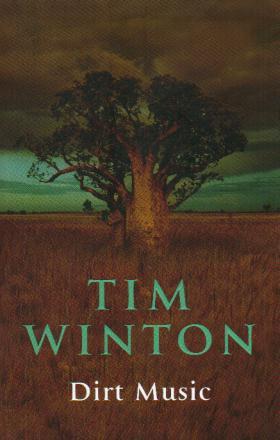
|
Dirt Music Tim Winton |
Dustjacket synopsis:
"Georgie Jutland is a mess. At forty, with her career in ruins, she finds herself stranded in White Point with a fisherman
she doesn't love and two kids whose dead mother she can never replace. Her days have fallen into domestic tedium and social
isolation. Her nights are a blur of vodka and pointless loitering in cyberspace. Leached of all confidence, Georgie has
lost her way; she barely recognises herself.
"One morning in the boozy pre-dawn gloom, she looks up from the computer screen to see a shadow lurking on the beach below, and a dangerous new element enters her life. Luther Fox, the local poacher. Jinx. Outcast.
"So begins an unlikely alliance. Set in the wild landscape of Western Australia, this is a novel about the odds of breaking with the past, a love story about people stifled by grief or regret, whose dreams are lost, whose hopes have dried up. It's a journey across landscapes within and without, about the music that sometimes arises from the dust.
"In prose as haunting and beautiful as its western setting, Dirt Music confirms Tim Winton's status as the pre-eminent Australian novelist of his generation."
First Paragraph
One night in November, another that had somehow become morning while she sat there, Georgie Jutland looked up to see her pale and furious face reflected in the window. Only a moment before she'd been perusing the blueprints for a thirty-two-foot Pain Clark from 1913 which a sailing enthusiast from Manila had posted on his website, but she was bumped by the server and was overtaken by such a silly rush of anger that she had to wonder what was happening to her. Neither the boat nor the bloke in Manila meant a damn thing to her; they were of as little consequence as every other site she'd visited in the last six hours. In fact, she had to struggle to remember how she'd spent the time. She had traipsed through the Uffizi without any more attention than a footsore tourist. She'd stared at a live camera image of a mall in the city of Perth, been to the Frank Zappa fan club of Brazil, seen Francis Drake's chamberpot in the Tower of London and stumbled upon a chat group for world citizens who yearned to be amputees.
Logging on - what a laugh. They should have called it stepping off. When Georgie sat down before the terminal she was gone in her seat, like a pensioner at the pokies, gone for all money. Into that welter of useless information night after night to confront people and notions she could do without. She didn't know why she bothered except that it ate time. Still, you had to admit that it was nice to be without a body for a while; there was an addictive thrill in being of no age, no gender, with no past. It was an infinite sequence of opening portals, of menus and corridors that let you into brief, painless encounters, where what passed for life was a listless kind of browsing. World without consequence, amen. And in it she felt light as an angel. Besides, it kept her off the sauce.
From the Picador hardback edition, 2001.
Note:
You can get full details of this, and other works by Tim Winton, at this
webpage.
The Strange Case of Dr Simmonds and Dr Glas, Dannie Abse
Shroud, John Banville
Critical Injuries, Joan Barfoot
Any Human Heart, William Boyd
The Next Big Thing, Anita Brookner
Peacetime, Robert Edric
Spies, Michael Frayn
Still Here, Linda Grant
The Mulberry Empire, Philip Hensher
Who's Sorry Now?, Howard Jacobson
If Nobody Speaks of Remarkable Things, Jon McGregor
Dorian, Will Self
Autograph Man, Zadie Smith
To the Last City, Colin Thubron
You can read further details about each of these novels on the 2002 Booker Longlist page.
This page and its contents are copyright © 2003-05 by Perry Middlemiss, Melbourne, Victoria, Australia.
Last modified: October 15, 2005.